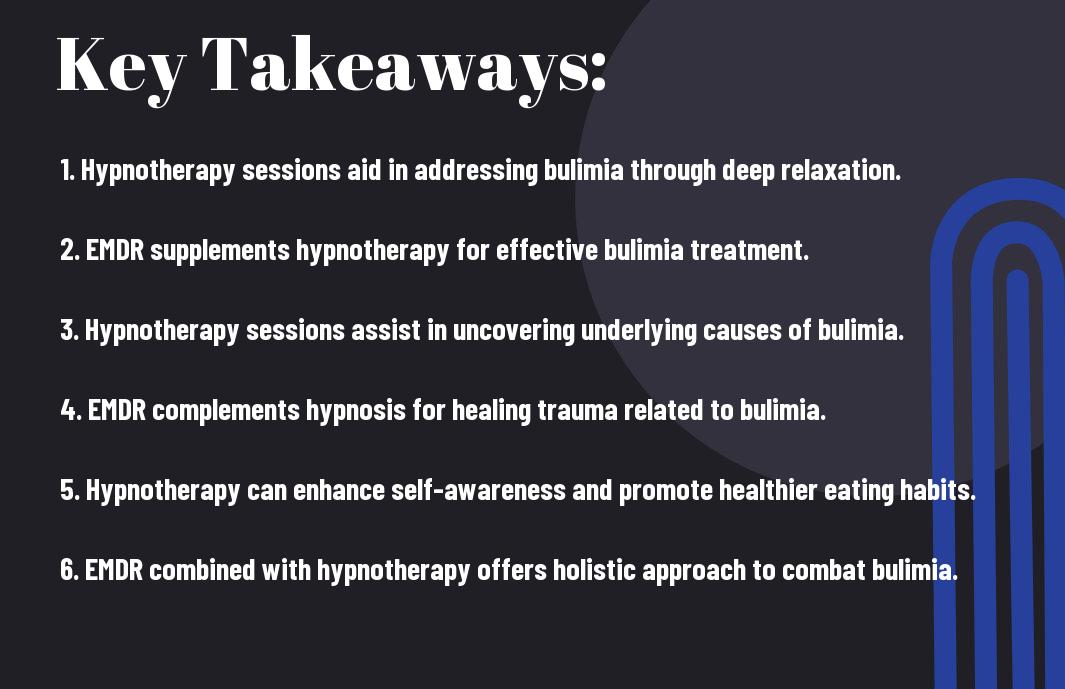Advanced Hypnotherapy Sessions and EMDR for Bulimia Relief
Just imagine a way to break free from the cycle of bulimia, utilizing the power of hypnotherapy sessions and EMDR. These innovative therapies offer a holistic approach to addressing the underlying causes of bulimia, providing a positive impact on mental and emotional well-being. Discover how hypnosis and EMDR can help you overcome bulimia and restore a healthier relationship with food and yourself.
Key Takeaways:
- Hypnotherapy sessions can play a significant role in providing relief for individuals struggling with bulimia.
- EMDR therapy is a beneficial tool that can complement hypnotherapy in treating bulimia by addressing past traumas and triggers.
- Combining hypnotherapy sessions and EMDR therapy can offer a comprehensive approach to healing from bulimia.
- During hypnotherapy sessions, individuals can explore underlying emotional issues and develop coping mechanisms to manage bulimic behaviours.
- EMDR therapy’s focus on reprocessing traumatic memories can facilitate long-lasting relief and break unhealthy patterns associated with bulimia.

What is Hypnotherapy?
Definition and Principles
One of the most common misconceptions about hypnotherapy is that it involves making individuals lose control of their minds. In reality, hypnotherapy is a therapeutic technique where a trained hypnotherapist guides a person into a heightened state of focused attention, also known as a trance. This state allows individuals to tap into their subconscious minds, where deep-seated beliefs and behaviours are stored, enabling them to make positive changes.
How it Works for Mental Health
For individuals struggling with mental health issues like bulimia, hypnotherapy can be a powerful tool for addressing the root causes of their condition. By accessing the subconscious mind during a trance state, hypnotherapy can help clients uncover and reframe negative thought patterns and behaviours that contribute to their bulimia. This process can lead to lasting changes in mindset and behaviour, promoting healthier coping mechanisms and reducing the frequency and severity of bulimic episodes.
Understanding how hypnotherapy works for mental health involves acknowledging its ability to access the subconscious mind where core beliefs and emotions reside. Through skilled guidance from a hypnotherapist, individuals can reprogram negative thought patterns and establish new, positive ways of thinking and responding to triggers. This empowering process can support those with bulimia in developing a healthier relationship with food and themselves.
The Connection Between Hypnotherapy and Bulimia
Psychological Roots of Bulimia
Bulimia nervosa is a complex eating disorder with deep psychological roots. It often stems from a combination of genetic, environmental, and social factors, leading to a distorted body image, low self-esteem, and unhealthy coping mechanisms. Individuals struggling with bulimia may use binge eating and purging as a way to manage difficult emotions or control their weight.
How Hypnotherapy Addresses Underlying Issues
Psychological approaches like hypnotherapy can offer a unique way to address the underlying issues contributing to bulimia. Through relaxation techniques and guided imagery, hypnotherapy helps individuals access their subconscious mind and uncover the root causes of their disordered eating patterns. By identifying and reframing negative thought patterns and behaviours, hypnotherapy empowers individuals to develop healthier coping strategies and improve their relationship with food and body image.
To effectively address bulimia, hypnotherapy sessions are tailored to each individual’s needs, allowing for personalized treatment and support. By working with a trained hypnotherapist, individuals can gain valuable insights into their triggers, learn to manage stress and anxiety more effectively and cultivate a positive self-image. The transformative power of hypnotherapy can enhance self-awareness, promote self-acceptance, and ultimately lead to lasting recovery from bulimia.
EMDR Therapy for Bulimia Relief
Despite the effectiveness of traditional therapy methods for treating bulimia, some individuals may find relief through alternative approaches like Eye Movement Desensitization and Reprocessing (EMDR) therapy. If you’re curious about how EMDR therapy can help with eating disorders, you can learn more about it here.
What is EMDR?
An innovative therapeutic approach, EMDR is a specialized form of psychotherapy designed to help individuals process distressing memories and experiences effectively. By targeting the root of trauma and anxiety, EMDR aims to reduce their impact on daily life and promote healing.
How EMDR Works for Trauma and Anxiety
EMDR facilitates reprocessing traumatic memories by utilizing bilateral stimulation, which can include eye movements, sounds, or taps. This dual attention helps the brain rewire itself, allowing for more adaptive processing of the traumatic events, ultimately reducing associated negative symptoms.
EMDR holds great promise for individuals struggling with trauma and anxiety. The approach is effective in releasing the emotional intensity linked to past experiences and aiding in the resolution of lingering psychological distress.
EMDR and Bulimia: A Promising Combination
It is increasingly recognized that EMDR can be valuable in the treatment of eating disorders like bulimia. By addressing underlying trauma and negative beliefs associated with body image and food, EMDR therapy can help individuals develop healthier coping mechanisms and attitudes towards food and their bodies.
EMDR offers a unique opportunity for individuals with bulimia to address the emotional roots of their struggles and work toward lasting recovery. By targeting the core issues driving the eating disorder, EMDR therapy can contribute to positive changes in behaviour and mindset.
How Hypnotherapy Sessions Can Help with Bulimia
After a thorough assessment with a qualified therapist, individuals struggling with bulimia may opt for hypnotherapy sessions as part of their treatment plan. Hypnotherapy can be a valuable tool in addressing the underlying issues that contribute to disordered eating behaviours. By accessing the subconscious mind, hypnotherapy aims to uncover and address the root causes of bulimia, promoting lasting healing and recovery.
Reducing Stress and Anxiety
On one level, hypnotherapy sessions can be beneficial in reducing stress and anxiety, which are often triggers for bulimic episodes. Through relaxation techniques and guided imagery, individuals can learn to manage their emotions in healthier ways. By addressing the mental and emotional components of bulimia, hypnotherapy can help individuals break free from the cycle of bingeing and purging.
Improving Self-Esteem and Confidence
One significant aspect of hypnotherapy for bulimia is its focus on improving self-esteem and confidence. Many individuals with bulimia struggle with negative self-perceptions and a lack of self-worth, which can perpetuate their disordered eating behaviours. Confidence-building techniques utilized in hypnotherapy sessions can help individuals cultivate a more positive self-image and embrace their worth beyond their physical appearance.
Changing Negative Thought Patterns
Sessions
Negative thought patterns and beliefs often lie at the core of bulimia and can be challenging to shift without targeted intervention. Hypnotherapy can help individuals identify and reframe these negative thought patterns, replacing them with more positive and empowering beliefs. By addressing these deep-seated beliefs through hypnotherapy sessions, individuals can develop a healthier mindset and attitude towards themselves and their relationship with food.

The Benefits of Combining Hypnotherapy and EMDR
Enhanced Emotional Regulation
Emotional regulation is a key component in overcoming bulimia, and the combination of hypnotherapy and EMDR can enhance this process significantly. Hypnotherapy helps individuals access their subconscious mind to reframe negative thought patterns and beliefs related to food and body image. At the same time, EMDR can target past traumas that may be contributing to emotional dysregulation. By combining these two approaches, individuals with bulimia can experience enhanced emotional awareness and control.
Increased Mindfulness and Self-Awareness
On top of emotional regulation, the combination of hypnotherapy and EMDR also fosters increased mindfulness and self-awareness. Hypnotherapy can deepen one’s connection to inner thoughts and emotions, while EMDR can help individuals process and integrate past experiences more effectively. This heightened awareness allows individuals to recognize triggers for their bulimic behaviours and develop healthier coping mechanisms.
To further promote mindfulness and self-awareness, therapists may incorporate techniques such as body scans and guided imagery during hypnotherapy sessions. These practices can help individuals stay present at the moment and cultivate a deeper understanding of their mind-body connection, fostering a more positive relationship with food and self-image.
Faster Progress and Lasting Results
One of the most significant advantages of combining hypnotherapy and EMDR for bulimia relief is the potential for faster progress and lasting results. Hypnotherapy can accelerate the therapeutic process by accessing the subconscious mind more directly, while EMDR can help individuals process traumas quicker than traditional talk therapy alone. This combined approach often leads to more rapid symptom improvements and a higher likelihood of sustained recovery.
Another benefit of integrating hypnotherapy and EMDR is the potential for creating lasting changes at a deeper level. By addressing both the conscious and subconscious aspects of bulimia, individuals can experience profound shifts in their behaviours, beliefs, and emotional responses. This comprehensive approach increases the likelihood of long-term success and provides a solid foundation for ongoing recovery.

What to Expect from Hypnotherapy and EMDR Sessions
Preparing for Your First Session
All hypnotherapy sessions and EMDR therapy for bulimia relief start with thorough preparation. From ensuring a comfortable environment to discussing your goals and concerns, your therapist will guide you. It’s vital to arrive with an open mind and be ready to engage in the therapy fully. Bear in mind, you are taking a proactive step towards healing.
Sessions: The Role of the Therapist and Your Active Participation
Sessions with a skilled therapist involve a collaborative effort between you and the professional. Trust in the process and be willing to engage in the techniques suggested by your therapist. Together, you will work towards identifying triggers, changing negative thought patterns, and developing healthier coping mechanisms. Your active participation is crucial for the success of the therapy.
This collaborative effort between you and the therapist creates a supportive environment that allows for profound changes to occur. Your therapist will provide guidance, but your willingness to participate actively in the process is key to achieving lasting relief from bulimia.
Overcoming Common Fears and Concerns
Common fears and concerns about hypnotherapy and EMDR may include worries about losing control, revealing personal information, or the effectiveness of the sessions. It is important to communicate openly with your therapist about these apprehensions. Recognize that hypnotherapy and EMDR are evidence-based treatments with proven results, and your therapist is there to support and guide you every step of the way.
Final Words
Drawing together hypnotherapy sessions and Eye Movement Desensitization and Reprocessing (EMDR) for bulimia relief offers a promising approach to addressing the underlying issues contributing to this eating disorder. By leveraging the power of hypnosis to access the subconscious mind and EMDR to reprocess traumatic memories, individuals struggling with bulimia may find relief and healing comprehensively and holistically.

Through the therapeutic combination of hypnotherapy sessions and EMDR, individuals can work towards breaking free from the destructive cycle of bulimia by uncovering and resolving deep-seated emotional wounds. This integrative approach offers a beacon of hope for those seeking lasting recovery and a healthier relationship with food and their bodies.
FAQ
Q: What is hypnotherapy and how can it help with bulimia?
A: Hypnotherapy is a form of therapy where the therapist induces a state of deep relaxation in the patient, allowing them to access their subconscious mind. It can help with bulimia by addressing underlying psychological issues and promoting positive behaviour change.
Q: How does EMDR work in treating bulimia?
A: Eye Movement Desensitization and Reprocessing (EMDR) is a therapy that helps individuals process traumatic memories and negative beliefs. In the context of bulimia, EMDR can target triggers or past experiences contributing to the eating disorder, leading to symptom relief.
Q: What are the benefits of hypnotherapy sessions for bulimia relief?
A: Hypnotherapy sessions offer a non-invasive and natural approach to addressing bulimia. By accessing the subconscious mind, hypnotherapy can help individuals uncover the root causes of their eating disorders, build healthier patterns, and enhance self-esteem.
Q: How many hypnotherapy sessions are typically needed to see results for bulimia relief?
A: The number of hypnotherapy sessions needed for bulimia relief can vary depending on the individual’s specific needs and response to treatment. Some individuals may start experiencing positive changes after just a few sessions, while others may benefit from ongoing therapy.
Q: Are hypnotherapy sessions and EMDR safe for treating bulimia?
A: Hypnotherapy sessions and EMDR are generally considered safe when conducted by trained and licensed therapists. These therapies focus on promoting healing and positive change in a supportive environment, making them valuable tools for addressing bulimia and its underlying causes.
The Official Instagram profile of Mind Spirit Body Hypnosis therapy and advanced hypnotherapy sessions.
About the author: Award-winning Fanis Makrigiannis of Mind Spirit Body Hypnosis therapy is a certified Hypnotherapist and Master Practitioner of Neuro-linguistic Programming with the American Board of Hypnotherapy. Proudly serving Durham Region, The Greater Toronto Area, Peel Region, Ontario, Canada, and the United States of America via Zoom meetings.




